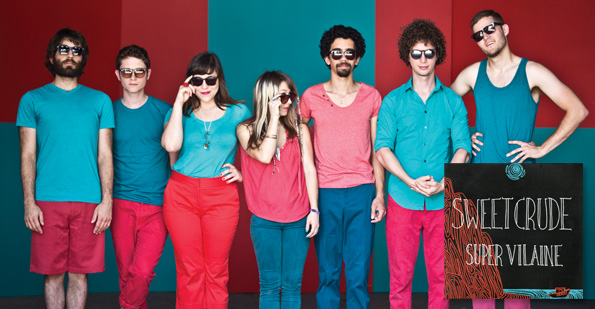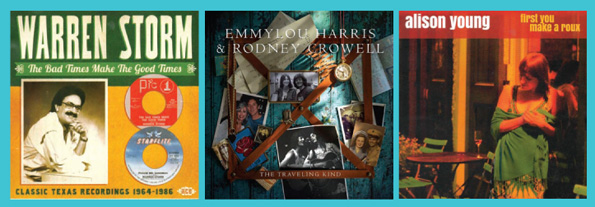Sweet Crude’s Bilingual Ebullience
Sweet Crude, a New Orleans-based band, enjoys great popularity in cutting-edge Cajun and Francophone circles.
Published: December 1, 2015
Last Updated: August 4, 2022

PHOTO BY ZACK SMITH PHOTOGRAPHY
Given this communal context of cultural continuity, it is pleasantly surprising indeed that a New Orleans-based band known as Sweet Crude enjoys great popularity in cutting-edge Cajun and Francophone circles—even though the group plays no Cajun music apart from one lone song, the Balfa Brothers’ “Parlez nous à boire.” Instead, Sweet Crude’s appeal to this heritage-conscious audience—as heard on the five-song CD Super Vilaine (sweetcrudeband.bandcamp.com)—is based largely on the band’s bilingual oeuvre of lyrics in English and Cajun French. But Sweet Crude also commands an equally loyal following in New Orleans, where Francophone awareness and activism are minimal. While most of Sweet Crude’s Crescent City fans are well out of the French linguistic loop, they respond to the band’s exuberant and extremely danceable style. With equal parts passion and proficiency—five of the seven band members have degrees in music—Sweet Crude combines striking originality with familiar elements of pop and rock from the 1970s on. In its prominent use of tom-toms and bells, classical and Broadway-musical flourishes, lush vocal harmonies and expressive lead singing, the group’s big, resonant sound recalls the work of such well-known bands as the Electric Light Orchestra, Talking Heads, and Tears For Fears. Groups regarded as somewhat more experimental and ambient, such as Animal Collective, and Grizzly Bear, have influenced Sweet Crude as well.
Numerous young Cajun/Creole musicians in Lafayette and environs sing in the Louisiana French that is still spoken there, unselfconsciously and devoid of cultural activism. Such usage has declined but remains extant. In New Orleans, however, spoken French dialects have been long gone for a century or more. But Sweet Crude’s co-founders and primary singers, Sam Craft and Alexis Marceaux, grew up with family elders who do, or did, speak Cajun French, which differs from what was once heard in New Orleans. Craft explains that the band was “inspired by the rapid decline of Louisiana French speech in everyday situations — that is, outside of academia. It was a desire to return to my own French heritage that imbued me with an urgency about the language. The idea to combine that with music came together for me instantly. I’m a songwriter, so it seemed obvious to want to give the language some additional posterity and share it with an audience.”
Craft and Marceaux taught themselves to speak Cajun French and are passing that skill on to their bandmates. “We decided to have a bilingual band,” Craft continues, “to represent the bilingual nature of the state.” As for the duality of the group’s name, Craft points out that “the juxtaposition of the words ‘sweet’ and ‘crude’ make for an oxymoron.” Sweet crude is a type of oil specifically noted for its low sulphur content—and, as Craft notes, “oil globalized Louisiana. Oil brought the interstate and a lot of maritime traffic. But oil also hurt our wetlands. Yet oil is this thing that we can’t live without.
“There are lots and lots of groups playing traditional Cajun music way better than we ever could,” Craft says, “so we figured to carve our own path, make something completely different, and add an indie-rock element to the history of Louisiana French music. Francophone audiences seem to appreciate it, which is actually rather surprising.” One very significant gauge of such acceptance is the band’s recent, well-received appearance at Festivals Acadiens et Créoles in Lafayette. Sweet Crude performed thanks to the prominent Louisiana linguist and Cajun folklorist Barry Ancelet. “When I first invited Sweet Crude to play our festival,” Ancelet comments, “some of my colleagues couldn’t see how they would fit. I explained that Sweet Crude represents thoughtful and imaginative evolution within the tradition—and Sweet Crude proceeded to fill the dance-floor with young couples. I love what they do.”
Aficionados of New Orleans indie-rock, as interpreted by the contemporary likes of Sweet Crude, will also be delighted to learn of some impending reunion appearances by the Song Dogs, one of the best such Crescent City bands to emerge during the 1980s. In addition, Alison Young—the band’s lead singer—has recently released a powerful five-song CD with the Louisiana-centric title First You Make A Roux (alisonyoung.bandcamp.com). This eclectic set of originals ranges from poignant balladry and well-crafted pop-rock to unabashed erotica that’s set to a sultry Afro-Cuban tresillo rhythm:
Everybody wants you, but I’m the one who’s takin’ you home
Knew it from the moment our eyes met across the room
All thrust and parry, all pretense of resistance will be just formalities
Lips will mingle, limbs entangle, forces lead us inexorably
Everybody’s watchin’ our story of seduction unfold
Every little signal from the tender to the tempting to the bold
Here on the dance floor we’re making love standing up, with all our clothes on
Think this is delicious, just wait til I get you alone…
Young delivers these steamy lyrics with suspenseful understatement and confident, mature phrasing. Her own rendition of “Everybody Wants You”—or a cover version sung by an established chanteuse—would fit perfectly on national radio, and/or in the soundtrack of a major feature film. Like Sweet Crude’s Super Vilaine, however, First You Make A Roux is self-released. Without the infrastructure and support of a record company it can be quite difficult for independent artists to achieve the mass-audience exposure and response that can dramatically boost their careers. More power to the dedicated musicians—and their counterparts in visual art, film, and writing—who courageously continue to create such first-rate, fully-realized, labor-of-love projects.

Details of the Song Dogs’ reunion performances during the impending holidays, and again during Jazz Fest, will be announced soon. Speaking of the holidays, those in search of musical gifts might consider several fine albums by artists/genres that are briefly noted in this instance, yet often discussed at length in this column. The Paris-based label, Fremeaux—in conjunction with Jean Buzelin and the documentarian Jean-Pierre Bruneau—has released a two-CD reissue anthology entitled Zydeco: Black Creole, French Music & Blues. 1929–1972. Much of the fine material here has been reissued previously on numerous different albums, but some songs, such as fiddler Douglas Bellard’s 1929 recordings, are much harder to find. A strong reissue of more recent vintage focuses on the great singing swamp-pop drummer Warren Storm, in a two-CD set entitled The Bad Times Makes The Good Times, Texas Recordings 1964–1986 (Ace). The progressive-country luminaries Emmylou Harris and Rodney Crowell have reunited for a soulful pairing entitled The Traveling Kind (Nonesuch). Amidst all the media-driven excess surrounding Hurricane Katrina’s tenth anniversary, Harris and Crowell came to New Orleans to play a benefit concert for Habitat of Humanity that marked this grim milestone with good taste, affirmation, and no grandstanding. Finally, Crowell and Harris’ progressive-country colleague, Joe Ely, has released Panhandle Rambler (Rack ‘Em Records) that continues his evocative exploration of the Southwestern sub-genre known as “Sagebrush Soul.” On one level, it’s somewhat disquieting to see Harris, Crowell and Ely emerge, over time, as elders in their field. But it is inspiring to see them do so at peak form in terms of both skill and creativity.
In closing, this column mourns the passing of Allen Toussaint—a brilliantly inventive songwriter, pianist, and producer/arranger, and a fine recording artist/performer in his own right. A primal creator of New Orleans rhythm & blues, Toussaint’s legacy is also that of a major contributor to popular music in America and Europe. In addition Allen Toussaint served as a tireless civic booster for New Orleans, especially in the wake of Hurricane Katrina. Such inspiring enthusiasm, along with his timeless songs, made Toussaint one of the city’s most beloved, iconic figures. It is difficult to envision New Orleans without him.
—–
Ben Sandmel is a New Orleans-based freelance writer, folklorist, and producer and is the former drummer for the Hackberry Ramblers. Learn more about his latest book, Ernie K-Doe: The R&B Emperor of New Orleans, by visiting erniekdoebook.com. The K-Doe biography was selected for the Kirkus Reviews list of best nonfiction books for 2012.
